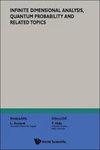经典随机变量的量子矩问题及相互作用Fock空间的分类
IF 0.8
4区 数学
Q4 MATHEMATICS, APPLIED
Infinite Dimensional Analysis Quantum Probability and Related Topics
Pub Date : 2022-03-02
DOI:10.1142/s0219025722500035
引用次数: 2
摘要
任何具有所有矩的经典随机变量都有量子分解,这一事实允许与它相关联的量子矩族。另一方面,一个经典随机变量可能有几个不相等的量子分解,这导致相同的经典,但不同的量子矩。即使在最简单的中心极限定理(CLT)中,即伯努利型定理中,也有相应的量子矩收敛于相关经典随机变量的正则量子矩的例子,也有不收敛的例子。这就提出了一个问题,即找到一个构造准则来表征与规范量子分解相关的量子矩(它是唯一的)相对于其他的量子矩。本文的定理3提供了这样一个判据。定理5处理的是先验地知道量子矩来自中心极限定理的情况(本文的动机就是在这种情况下产生的)。它只给出了一个充分条件,但比定理3的充分必要条件更容易证明。定理3自然地将相互作用的Fock空间(IFS)划分为三种类型。我们构建的例子表明,所有这些可能性都可以有效地发生。在此过程中,我们证明了所有最著名的海森堡对易关系的变形都可以作为正交多项式理论的代数方法中一般构造的特殊情况得到。本文章由计算机程序翻译,如有差异,请以英文原文为准。
The quantum moment problem for a classical random variable and a classification of interacting Fock spaces
The fact that any classical random variable with all moments has a quantum decomposition allows to associate to it a family of quantum moments. On the other hand, a classical random variable may have several inequivalent quantum decompositions, which lead to the same classical, but different quantum moments. Even in the simplest Central Limit Theorems (CLT), i.e. those of Bernoulli type, there are examples in which the corresponding quantum moments converge to the canonical quantum moments of the associated classical random variable, and examples in which this is not the case. This poses the problem to find a constructive criterium that characterizes the quantum moments associated to the canonical quantum decomposition (which is unique) with respect to the other ones. Theorem 3 of the present paper provides such a criterium. Theorem 5 deals with the case when one knows a priori that the quantum moments come from a central limit theorem (the motivation of the present paper arose in this context). It gives only a sufficient condition, but simpler to verify than the necessary and sufficient conditions of Theorem 3. Theorem 3 naturally leads to a classification of Interacting Fock Spaces (IFS) into three types. We construct examples showing that all these possibilities can effectively take place. On the way, we prove that all the best known deformations of Heisenberg commutation relations can be obtained as special cases of a general construction within the algebraic approach to the theory of orthogonal polynomials.
求助全文
通过发布文献求助,成功后即可免费获取论文全文。
去求助
来源期刊
CiteScore
1.50
自引率
11.10%
发文量
34
审稿时长
>12 weeks
期刊介绍:
In the past few years the fields of infinite dimensional analysis and quantum probability have undergone increasingly significant developments and have found many new applications, in particular, to classical probability and to different branches of physics. The number of first-class papers in these fields has grown at the same rate. This is currently the only journal which is devoted to these fields.
It constitutes an essential and central point of reference for the large number of mathematicians, mathematical physicists and other scientists who have been drawn into these areas. Both fields have strong interdisciplinary nature, with deep connection to, for example, classical probability, stochastic analysis, mathematical physics, operator algebras, irreversibility, ergodic theory and dynamical systems, quantum groups, classical and quantum stochastic geometry, quantum chaos, Dirichlet forms, harmonic analysis, quantum measurement, quantum computer, etc. The journal reflects this interdisciplinarity and welcomes high quality papers in all such related fields, particularly those which reveal connections with the main fields of this journal.

 求助内容:
求助内容: 应助结果提醒方式:
应助结果提醒方式:


